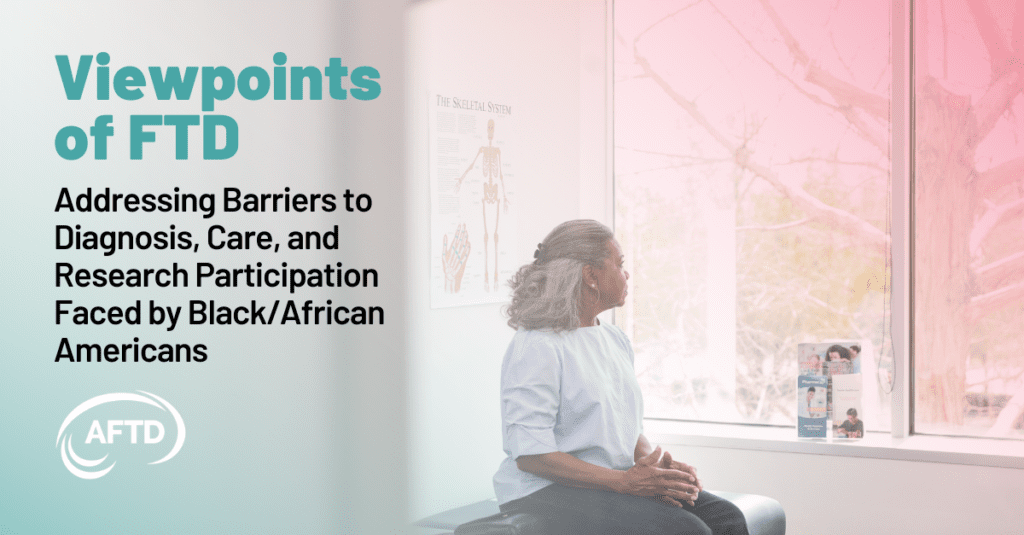Viewpoints of FTD: Addressing Barriers to Diagnosis, FTD Care, and Research Participation Faced by Black/African Americans

In 2011, researchers estimated there to be 50,000-60,000 cases of FTD in the United States. Today, however, researchers believe this figure to be an undercount. One reason for this is a notable lack of representation of diverse populations in FTD research, such as the Black/African American community.
Research on the experience of Black/African Americans on the FTD journey has been limited in the past, with much existing research being derived from studies whose participants were primarily White families of European descent. Momentum is growing among researchers, however, to better understand and address the unique challenges that FTD presents to Black/African American families.
An Obstacle-Laden FTD Journey
AFTD’s 2021 FTD Insights Survey has shown that Black/African Americans are less likely to receive a timely diagnosis and more likely to see four or more doctors before receiving a diagnosis, relative to the population at large. And Black Americans affected by FTD often face additional difficulties beyond the challenge of managing the disease. In an interview with Partners in FTD Care, Black care partners Aisha Adkins and Malcoma Brown-Ekeogu spoke about the barriers they have faced trying to access FTD care for their loved ones.
Adkins told AFTD she and her father had trouble trying to convince practitioners that something was wrong with her mother. “The first few doctors were very skeptical – even doubtful – of my father and I and our observations about my mother’s behavior,” Adkins said. “Even when my mother herself reported her own concerns, they had doubts. The initial diagnosis was depression, despite our insistence that the problem ran deeper. Unfortunately, it’s been documented that health professionals’ doubt of Black patients is a systemic issue.”
These added delays to diagnosis can have profound consequences on Black/African American families. Preliminary data from a study by the University of Pennsylvania showed that Black/African Americans were more likely to be diagnosed with a higher Clinical Dementia Rating (a scale used to measure the severity of dementia), which researchers suggested indicates delayed diagnosis of FTD.
Additionally, research has consistently shown that FTD symptoms present differently in different ethnic/cultural contexts. According to the UPenn study, Black/African Americans were “more likely to exhibit delusions, agitation, and depression but less likely to exhibit apathy at their initial visit.” The researchers noted that Black Americans are more likely to be misdiagnosed if their symptoms don’t match the current clinical criteria. Brown-Ekeogu experienced difficulties with misdiagnosis when seeking care for her husband.
“Our primary care doctor said he may be dealing with depression,” Brown-Ekeogu said. “I knew he was not depressed. I know what depression looks like from other family members. We ended up seeing two neurologists. Every time you see a new doctor, it’s like starting over.”
Disinhibition is a common symptom of FTD that can lead to socially inappropriate behavior, misdemeanor offenses, and traffic violations. To make matters worse, the U.S. justice system often stumbles when faced with FTD and other dementias. FTD-related disinhibition can create acute concerns for Black families, who face a disproportionate impact from police brutality, which the American Medical Association recognizes as a byproduct of structural racism.
In 2017, an AFTD-funded study on the social/economic burden of FTD found that families facing the disease experience almost twice the annual costs of families with Alzheimer’s disease. For Black/African American families, the systemic inequalities in American society often exacerbate these challenges even further. U.S. Census data indicates that Black Americans face a higher rate of poverty (19.5%, considerably higher than the 11.6% rate for Americans overall), suggesting lessened access to economic resources. Additionally, Black care partners more often report poorer mental and physical health.
Breaking Barriers for Black/African American Families Affected by FTD
AFTD and the FTD field are working to address the barriers faced by Black/African American families on the FTD journey. One of the main methods of furthering this goal is the greater inclusion of Black people who have been diagnosed, Black care partners, and their families in FTD research.
In addition to economic and health insurance-related obstacles, researchers have identified cultural barriers, lack of awareness of FTD, and the stigma surrounding dementia as crucial hurdles to overcome.
FTD scientists are working to overcome these obstacles with more inclusive and culturally informed study design. The Biomarker Evaluation in Yong Onset Dementia from Diverse Populations (BEYONDD) study is one such initiative working to assess the causes and frequency of young-onset dementia in diverse populations. In addition to making participation more accessible through remote visits and at-home blood draws, BEYONDD empowers participants by providing them with both their own test results and the study’s overall findings.
Efforts are also being made to bring FTD/dementia education and support to Black/African American communities through other avenues. In 2019, Fayron Epps, PhD, RN, and a team of African American health professionals created the Alter program, which partners with Black faith communities to create dementia-friendly and inclusive environments.
Religion provides hope and a framework for finding meaning during difficult times and can provide families with dedicated sources of support. Alter taps into this existing network of support to educate faith communities on the challenges of FTD and other dementias, make environmental modifications to make churches dementia-friendly, and guide congregational leaders in the creation of support programs. In doing so, Alter and faith leaders across the U.S. are setting a precedent of understanding and support for Black/African American families on the FTD journey.
For more information, read the Partners in FTD Care issue Black/African Americans and FTD.
If you have questions about diagnosis, symptoms, or simply need to talk to somebody who understands what you’re going through, the AFTD HelpLine is here for you. Contact the HelpLine at 1-866-507-7222 or info@theaftd.org.
By Category
Our Newsletters
Stay Informed
Sign up now and stay on top of the latest with our newsletter, event alerts, and more…
